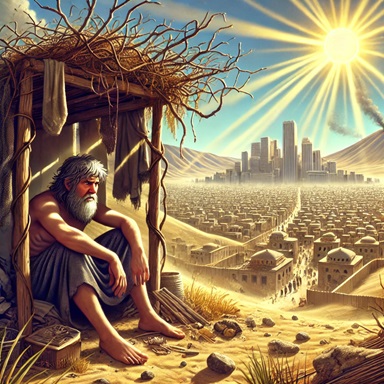
Jonah's Anger
Created by ChatGPT-4o/DALL-E3, 2024-11-05
My dear friends,
The final chapter of the Book of Jonah is a profound illustration of the spiritual battle between divine compassion and human ego-driven emotions. This story, unique among the prophetic books for its focus on the prophet's personal struggles, serves as a lesson in confronting and transforming self-righteousness and anger.
how they turned from their evil ways,
God changed his mind about the calamity
that he had said he would bring upon them,
and he did not do it.
But this was very displeasing to Jonah,
and he became angry.
- Jonah 3:10-4:1
Here, we witness a stark contrast between the boundless compassion of the divine and Jonah's anger—a reminder of how human attachments and aversions, known as kleshas in Buddhist teachings, cloud our hearts. Jonah's reaction reflects how deeply the roots of pride and a sense of self-righteousness can grow, even in the most spiritually aware individuals. The divine response shows us the nature of true bodhicitta, which seeks the well-being of all without discrimination.
"O LORD! Is not this what I said while I was still in my own country?
That is why I fled to Tarshish at the beginning, for I knew that you are a gracious and merciful God,
slow to anger, abounding in steadfast love, and relenting from punishment.
And now, O LORD, please take my life from me, for it is better for me to die than to live."
And the LORD said, "Is it right for you to be angry?"
- Jonah 4:2-4
Jonah's reaction unveils how self-grasping ignorance clouds wisdom. This ignorance births pride and an inflated sense of one's own moral superiority, which, when challenged by divine mercy, devolves into anger. This pride, like the wrath it breeds, is born of attachment to one’s judgment and inability to see others with equanimity. The Lord’s gentle question, "Is it right for you to be angry?" invites Jonah—and us—to introspect on the validity and root of our emotions.
He sat under it in the shade, waiting to see what would become of the city.
The LORD God appointed a bush and made it come up over Jonah,
to give shade over his head, to save him from his discomfort,
so Jonah was very happy about the bush.
- Jonah 4:5-6
In this scene, Jonah’s fleeting joy at the temporary shade provided by the bush exemplifies the human tendency to find solace in impermanent comforts. Such moments reveal how easily one’s mind shifts from anger to satisfaction when favorable conditions arise, highlighting the ignorance of impermanence. This ignorance traps us in cycles of attachment and disappointment.
When the sun rose, God prepared a sultry east wind,
and the sun beat down on the head of Jonah so that he was faint and asked that he might die.
He said, "It is better for me to die than to live."
But God said to Jonah, "Is it right for you to be angry about the bush?"
And he said, "Yes, angry enough to die."
- Jonah 4:7-9
The withering of the bush exposes Jonah’s fragile contentment, dependent on external circumstances. When faced with discomfort, his latent anger resurfaces. This response underscores how ignorance of the impermanent nature of worldly supports breeds suffering and how clinging to these temporary sources of relief leads to deeper anguish. The divine question again challenges Jonah to recognize his misplaced attachment and the futility of such anger.
"You are concerned about the bush, for which you did not labor and which you did not grow;
it came into being in a night and perished in a night.
And should I not be concerned about Nineveh, that great city,
in which there are more than a hundred and twenty thousand persons
who do not know their right hand from their left
and also many animals?"
- Jonah 4:7-10
The conclusion of the book, with God’s final word, gently confronts Jonah’s narrow compassion. Jonah’s anger over the ephemeral bush contrasts starkly with God’s boundless concern for an entire city filled with lives. This passage invites us to reflect on how often our anger and self-righteousness stem from personal discomfort or limited vision. The cure for such myopia lies in adopting a perspective akin to bodhicitta—an expansive, unconditional concern for the well-being of all. Only through understanding impermanence and cultivating compassion can we free ourselves from the chains of anger and truly align with the divine heart.
May we learn from Jonah’s journey that the path to inner peace and wisdom lies in letting go of our self-centered attachments and embracing a compassionate, expansive view of the world. In this, we align ourselves with the highest teachings of both Christ and the Dharma, finding unity in love and understanding.